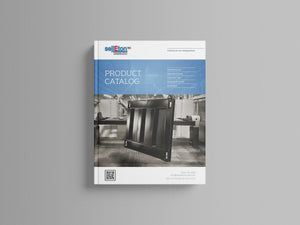
Understanding Load Cell Scales: Precision in Every Measurement
Understanding Load Cells
Load cells are a crucial component in various weighing systems, including truck scales, floor scales, and tank weighing systems. They are designed to convert mechanical force, such as tension, compression, or pressure, into an electrical signal that can be easily measured and displayed. Also known as force transducers or weight sensors, load cells play a vital role in ensuring accurate and reliable weight measurements.
There are several types of load cells available, each suited for specific industrial applications. Beam load cells, for instance, are commonly used in truck scales and floor scales due to their robust design and high accuracy. Shear beam load cells are often employed in tank weighing systems, where they provide precise measurements of liquid levels. S-type load cells, known for their versatility, can handle both tension and compression forces, making them ideal for a variety of applications.
Typically constructed from stainless steel, load cells feature strain gauges that deform under applied force, causing a change in electrical resistance. This change is measured and converted into an output signal proportional to the force exerted. The result is an accurate and reliable weight measurement that can be used in numerous industrial applications.
Load cells are not only accurate and reliable but also durable and versatile. They can be used in a wide range of capacities, from weighing small objects to measuring the weight of large tanks and hoppers. This versatility makes them indispensable in many industrial settings, ensuring precise measurements across various applications.
What Are Load Cell Scales, and How Do They Work?
At the heart of many modern weighing systems lies the load cell scale, a revolutionary device designed to measure weight with remarkable precision. Load cells are transducers that convert a force, such as weight, into an electrical signal. This signal is then interpreted by a digital display or connected device to provide an accurate measurement.
The functionality of load cells hinges on four main components:
- Strain Gauges: Thin wires or foil bonded to the load cell deform under pressure, altering their resistance.
- Bridge Circuit: A Wheatstone bridge circuit amplifies the resistance changes into measurable voltage.
- Signal Conditioning: The electrical signal is further processed for readability.
- Digital Display or Controller: The processed signal is displayed or integrated into automated systems.
These components work together seamlessly, making load cell scales indispensable in environments where precision is critical.
Industries and Applications That Rely on Load Cell Technology
Load cell technology is versatile and plays a vital role in numerous industries:
- Manufacturing and Production: Load cell scales are used for material handling, monitoring production lines, and ensuring the weight consistency of finished products.
- Agriculture: In farming, load cells for tanks are used to measure feed or liquids like water and fertilizer, ensuring optimal resource usage.
- Logistics and Transportation: Load cell scales ensure vehicles meet weight regulations and optimize cargo distribution for safety and efficiency.
- Food and Beverage: Accurate weighing is critical in food processing to maintain consistency and adhere to regulations.
- Chemical and Pharmaceutical: Precision is paramount in these industries. Tank scales with load cells monitor liquid levels and ensure accurate dosing during production.
- Retail and Commerce: Load cell scales are found in checkout counters and packaging facilities, providing reliable weight data for pricing and labeling.
- Durable Environments: Hydraulic scales are used in environments that require durability, particularly in moist conditions. Despite their lower precision compared to pneumatic load cells, they are favored for their resilience.
By adapting to diverse applications, load cells for sale have become integral to many industries’ operational success.
Key Factors to Consider When Selecting a Load Cell Scale
Choosing the right load cell scale requires evaluating several key factors to ensure it meets your needs:
- Capacity: Determine the maximum weight your application requires and select a scale that accommodates this range without compromising accuracy.
- Type of Load Cell: Load cells come in various forms, such as single-point, shear beam, and compression. Additionally, there are different load cell types like strain gauge, beam, hydraulic, and pneumatic load cells. Each type has its advantages and is suited to specific applications. For instance, strain gauge load cells are known for their precision, while hydraulic load cells are ideal for heavy-duty applications. Choose the type suited to your application, such as tank scales for liquid measurement or platform scales for general use.
- Material: Scales made from stainless steel or aluminum offer durability and resistance to environmental factors like corrosion.
- Environmental Conditions: Consider the operating environment, including temperature, moisture, and potential exposure to chemicals. Look for load cells with appropriate protection ratings.
- Connectivity: Modern scales often come with features like wireless connectivity and integration with software systems for data analysis.
- Calibration and Maintenance: Opt for load cells that are easy to calibrate and maintain to ensure long-term reliability and precision.
By considering these factors, you can select a load cell scale tailored to your specific operational needs.
Professional Installation and Setup
Professional installation and setup of load cells are crucial to ensure accurate and reliable weight measurements. Improper installation can lead to errors and inaccuracies, which can have serious consequences in industrial applications.
When installing load cells, it is essential to follow the manufacturer’s instructions and guidelines meticulously. This includes ensuring that the load cell is properly calibrated and configured for the specific application. Proper connection to the weighing system is vital, and all necessary junction boxes and cables must be in place to ensure seamless operation.
In addition to proper installation, regular maintenance and repair are essential to ensure the longevity and accuracy of load cells. This includes routine cleaning and inspection of the load cell, as well as periodic calibration and testing to maintain optimal performance. By adhering to these practices, businesses can ensure that their load cells provide accurate and reliable measurements over the long term.
Benefits of Load Cell Scales for Precision and Durability
The popularity of load cell scales stems from their unmatched precision and robust construction. Here are the key benefits they offer:
- High Accuracy: Load cells provide highly precise measurements, making them ideal for applications where even minor weight discrepancies matter.
- Versatility: From measuring liquids in tank scales to weighing heavy machinery, load cells adapt to a variety of tasks and industries.
- Durability: Built to withstand heavy loads and harsh conditions, load cell scales offer long-term reliability, even in demanding environments. Hydraulic scales, in particular, are favored for their resilience in moist conditions, despite their lower precision compared to pneumatic load cells.
- Compact and Efficient: Their compact design allows for integration into small spaces without sacrificing performance.
- Automation Compatibility: Many load cell scales integrate with automation systems, streamlining operations and reducing manual intervention.
- Cost-Effectiveness: Despite their advanced technology, load cell scales are an affordable solution for industries seeking accuracy and efficiency.
By leveraging these benefits, businesses can enhance productivity and maintain consistent quality across operations.
Conclusion
Load cell scales are indispensable tools for industries that demand precision, durability, and versatility. From agriculture and logistics to manufacturing and retail, these scales provide reliable weight measurements that streamline operations and ensure compliance.
At Selleton Scales, we offer a wide range of load cells for sale, including specialized tank scales and other configurations to meet diverse industry needs. Explore our collection here and discover how load cell scales can elevate your business operations today!
